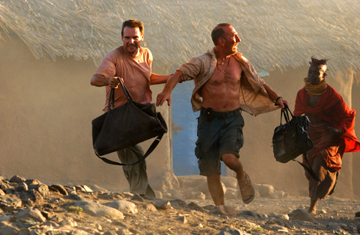 Ralph Fiennes and Pete Postlethwaite flee murderous agents in Africa in\r\n‘The Constant Gardener.’
Ralph Fiennes and Pete Postlethwaite flee murderous agents in Africa in\r\n‘The Constant Gardener.’
|
| The Constant Gardener\r\nStarring Ralph Fiennes and Rachel Weisz. Directed by Fernando Meirelles. Written by Jeffrey Caine, based on John le Carré’s novel. Rated R. |
|
A D V E R T I S E M E N T
|
|
|
|
A D V E R T I S E M E N T
|
|
The Official Story
The Constant Gardener entertains and raises questions in one thrilling package.
By KRISTIAN LIN
City of God wasn’t Fernando Meirelles’ first film, but most moviegoers outside of Brazil were introduced to his blazing talent by that searing, vibrant, densely packed crime saga. His particular skills make him singularly accessible to American audiences, especially now as they flock to gritty high-profile thrillers. His English-language debut, The Constant Gardener, solidifies his reputation, even if it doesn’t have City of God’s exquisite balance of genres. This movie has the pacing and electricity of a first-rate action flick. At the same time, it has an epic’s expansiveness, with well-drawn supporting characters and journalistic details filling the margins. As an indictment of the western world’s dirty dealings in Africa, it’s a much more layered and nuanced work than Hotel Rwanda, never mind The Interpreter. It’s the sort of movie John Sayles is always trying to make, except that it’s better than all but Sayles’ best. Very simply, Fernando Meirelles is currently the best filmmaker in the world at blending entertainment with social consciousness, better even than Steven Soderbergh.
The movie’s adapted from John le Carré’s 2000 novel of intrigue, a solid piece of work even though the author dates himself through his plot’s reliance on incriminating letters between characters who’d be more likely to communicate via voice mail or e-mail. The main character is Justin Quayle (Ralph Fiennes), a mid-level British diplomat who lives to smooth over rough situations and likes to spend his spare time tending his garden. As occasionally happens, this naturally timid man has married a firebrand, a graduate student named Tessa (Rachel Weisz). We first see her in a classroom raging at Britain’s involvement in the Iraq war, to the point where even fellow students who agree with her are telling her to shut up. These two complement each other, and when Justin is posted to Kenya, Tessa comes along to be with him and do humanitarian work. Soon after the movie begins, however, she’s lying in a morgue after supposedly falling victim to rural bandits. There’s enough wrong with the official story surrounding her death to spur the grieving Justin to carry out his own investigation. Crisscrossing the globe, he finds what she stumbled on: evidence of a major pharmaceutical company illegally testing its experimental drugs at Kenya’s free clinics. The corporation is proceeding on the politically sound but ethically despicable logic that if the pills have deadly side effects, which they do, it’s better if they kill poor, malnourished, AIDS-infected Africans instead of Western consumers.
Usually when Big Pharm is presented as a movie villain, it’s in the context of science fiction. The way the film presents this all-too-plausible scenario and its choice of an unfamiliar target helps make for a fresh take on things. The complex narrative unfolds with dazzling clarity, thanks to Meirelles’ sophisticated storytelling techniques. The director also has a great sense of place — a tense confrontation on a golf course ends with a long shot of the green viewed from a road bustling with Kenyans carrying their belongings on their backs. He gives us crackling action sequences, too, ranging from a frantic escape from bandits through the African bush to an ominous drive-by threat on a German street crowded with children.
Like City of God, The Constant Gardener is many different movies in one. A major plotline concerns Justin fully getting to know his wife after she’s gone, as he wonders whether she was having an affair with the handsome young doctor (Hubert Koundé) who disappeared when she died. This part of the film is somewhat less successful because of the casting. Fiennes is right for his role — his specialty is playing tormented guys who try to keep that English stiff upper lip but whose suffering is plainly visible. Weisz, on the other hand, doesn’t have the softer side to counteract her character’s stridency. (The part needed somebody like Kate Winslet or Emily Watson.) Tessa’s presence is supposed to haunt this film from the grave, and Weisz isn’t nearly strong enough to do that.
However, this is a minor flaw compared with everything else that’s here. The web of this far-flung plot takes in a great many characters: Justin’s backstabbing best friend and colleague who lusted after Tessa (Danny Huston), a German doctor working in conflict zones as a form of penance (Pete Postlethwaite), a thuggish businessman (Gerard McSorley) spewing Irish-accented profanities in polite company, and Tessa’s effeminate lawyer and first cousin (Richard McCabe) who delivers the movie’s concluding ringing denouncement of all the responsible parties. As a sinister boss back in London, Bill Nighy is deliciously funny appraising Justin’s lunch order with a regretful “You should have had the meunière.”
Ultimately, The Constant Gardener is driven by a vast global conspiracy aimed not at Justin but an entire continent. The common interests of profit-minded business executives, government officials concerned with their international competitors, and corrupt African leaders selling out their own people contribute to the ongoing misery of millions, and the trail leads all the way back to you and me. Meirelles welcomes us to the viper’s nest with an action movie whose very intelligence and global awareness generate tremendous thrills of its own.
 Email this Article...
Email this Article...

